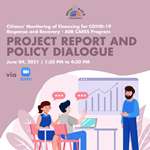Published on Thu, 2021-07-08 12:37
Two days ago at the opening of the UN High-level Political Forum (HLPF) the head of the World Trade Organization (WTO), Ngozi Okonjo-Iweala, addressed the problem of inequalities-- inside households, within national economies and across different countries. Concerning “vaccine inequality”, she added that as of 1 July there had been 1.3 doses per 100 people in least developed countries (LDCs) compared with 83 doses per 100 people in developed countries. |
Published on Fri, 2021-07-02 18:52
The Fifth United Nations Conference on the Least Developed Countries (LDC5) will be held In Doha, Qatar in January 2022. Preparations are already underway to negotiate the Outcome Document to be adopted in Doha, which will serve as a new 10-year Programme of Action (PoA) for the LDCs. On 20 May 2021, Co-Chairs of the LDC5 Preparatory Committee bureau--Rabab Fatima, Permanent Representative of Bangladesh and Bob Rae, Permanent Representative of Canada--facilitated a virtual consultation with Civil Society Organizations (CSOs), designed to address policy prescriptions that LDC5 must deliver to meet the needs of people and planet. |
Published on Thu, 2021-06-03 13:18
Social Watch Philippines is organizing a Policy Dialogue on June 4, 2021 (Friday), from 1:30PM-4:30PM (Manila time) via Zoom in order to present the findings on the Citizens' Report of the AIIB Financing for COVID-19 Response and Recovery as well as key recommendations of the research to government leaders as well as representatives from civil society, people’s organizations, and other stakeholders. The objective of the Policy Dialogue is to present the Final Report to policymakers, to the CSO community, the media, and other stakeholders, in particular the key findings as well as recommendations, and to collectively generate learnings and insights on the importance of citizens’ engagement in the various aspects of public financing, including the accessing of loans, for government programs to combat the negative effects of the COVID-19 pandemic. |
Published on Tue, 2021-06-01 11:53
The Covid-19 pandemic is affecting the whole world, but in differentiated ways, highlighting structural inequalities within and between countries. The confluence of a health emergency and economic crisis has shown the disastrous consequences of undermining democratic governance and weakening public services. The crisis has elicited much talk of solidarity. But the brutal competition for vaccines shows that solidarity is used merely as a rhetorical phrase. The interests of a privileged elite continue to dominate. The prospects for recovery are diverging dangerously within and across countries and regions. The slogan “Leave no one behind” of the 2030 Agenda remains a mere mockery. |
Published on Tue, 2021-05-11 14:14
Arab NGO Network for Development (ANND) strongly condemns the attacks on defenseless Palestinians in Jerusalem and its neighborhoods, especially the attempt to uproot the residents of Sheikh Jarrah, calls on the international community to launch the broadest solidarity campaign with the Palestinian people and provide international protection for defenseless citizens in implementation of international laws, especially the Geneva Convention. |







